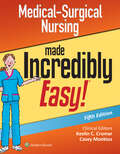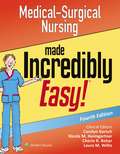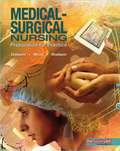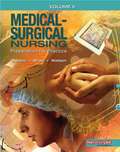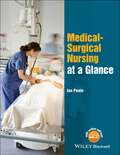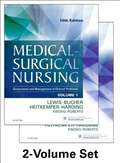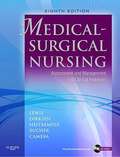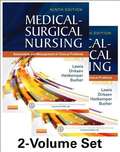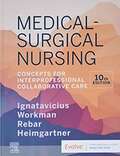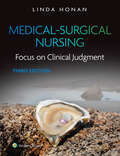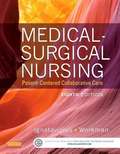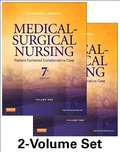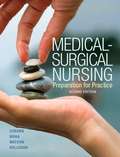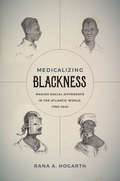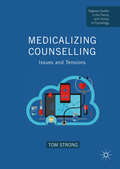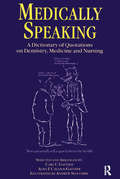- Table View
- List View
Medical, Psychosocial And Vocational Aspects Of Disability
by Martin Brodwin John Howard Frances Siu Erin Brodwin Ashley DuMedical, Psychosocial and Vocational Aspects of Disability (4th Ed. )
Medical-Surgical Nursing
by Adrianne Dill Linton Mary Ann MattesonProvide quality nursing care for adults with medical-surgical and psychiatric disorders!Building upon the fundamentals of nursing, Medical-Surgical Nursing, 8th Edition helps you master the role and responsibilities of the LPN/LVN in medical-surgical care. The text addresses the special problems of older adult patients, then covers each major disorder by body system, presenting patient problems, goals, outcome criteria, and nursing interventions. As LPN/LVNs do not formulate NANDA diagnoses, the book is organized by patient problems rather than NANDA nursing diagnoses. Written by noted educators Adrianne Dill Linton and Mary Ann Matteson, this text helps you build the clinical judgment skills you need to succeed on the Next-Generation NCLEX-PN® examination and in nursing practice.
Medical-Surgical Nursing Made Incredibly Easy (Incredibly Easy! Series®)
by Lippincott Williams WilkinsFeeling anxious or unsure about medical-surgical nursing care? Get grounded in the latest best practices, with the freshly updated Medical-Surgical Nursing Made Incredibly Easy!®, Fifth Edition. This colorful, fully illustrated guide offers clear, concise descriptions of crucial medical-surgical nursing concepts and procedures, with learning aids that help you grasp skills and concepts easily, in enjoyable Incredibly Easy style. From assessment and diagnostics to current evidence-based treatments and interventions, this is the perfect backup to class materials, a helpful support for new nurses, and a handy refresher for experienced nurses.
Medical-Surgical Nursing Made Incredibly Easy! (Incredibly Easy! Series® Series)
by Springhouse Publishing Company Staff Lippincott Williams and Wilkins StaffGet the vital concepts, data, and how-to on medical-surgical nursing with the newly updated Medical-Surgical Nursing Made Incredibly Easy, 4th Edition . This fun-but-informative guide uses colorful drawings and diagrams to demonstrate the mechanisms and clinical indications of the most common disorders found in each body system—followed by clear-cut direction on assessments, interventions, and evidence-based treatments. An ideal support to class materials and NCLEX ® preparation, this is also the perfect on-the-spot refresher for nurses in every kind of medical-surgical practice.
Medical-Surgical Nursing Preparation for Practice, Volume One
by Kathleen S. Osborn Cheryl E. Wraa Annita B. WatsonThis medical-surgical nursing textbook focuses on providing students with rationales for why they do what they do, and presents a foundation on which to build the nursing practice of today and tomorrow, including the cognitive, affective, and psychomotor skills necessary to practice.
Medical-Surgical Nursing Preparation for Practice, Volume Two
by Kathleen S. Osborn Cheryl E. Wraa Annita B. WatsonThe book consists of 16 units sequenced from simple, basic concepts to complex, medical-surgical disorders. The contents cover: introduction to general concepts related to health care delivery, followed by basic concepts related to nursing practice; physiological concepts and the theoretical basis of skills that are germane to all areas of nursing practice; focus on physiological disorders common to medical-surgical nursing.
Medical-Surgical Nursing at a Glance
by Ian PeateMedical-Surgical Nursing at a Glance is the perfect companion for study and revision for nursing and healthcare students from the publishers of the market-leading at a Glance series. This easy-to-read, accessible guide brings together all the key principles of caring for patients with medical and surgical needs. Highly visual, each topic is covered in one two-page spread, making it easy to quickly read up on key information and grasp the essentials of the key aspects of caring for the adult patient. A clear and accessible foundation of the need to know aspects of medicine and surgery for nurses Takes a systems approach exploring nursing care of key medical and surgical conditions and disorders Covers assessment, nutrition, pain, infection control Supported by a companion website with over 300 interactive multiple choice questions Provides need-to-know information in a quick-reference format Written from a UK perspective, with application to clinical practice Medical-Surgical Nursing at a Glance is ideal for nursing students looking for a clear and visual summary of care of the adult patient.
Medical-Surgical Nursing at a Glance (At a Glance (Nursing and Healthcare))
by Ian PeateMedical-Surgical Nursing at a Glance is the perfect companion for study and revision for nursing and healthcare students from the publishers of the market-leading at a Glance series. This easy-to-read, accessible guide brings together all the key principles of caring for patients with medical and surgical needs. Highly visual, each topic is covered in one two-page spread, making it easy to quickly read up on key information and grasp the essentials of the key aspects of caring for the adult patient. A clear and accessible foundation of the need to know aspects of medicine and surgery for nurses Takes a systems approach exploring nursing care of key medical and surgical conditions and disorders Covers assessment, nutrition, pain, infection control Supported by a companion website with over 300 interactive multiple choice questions Provides need-to-know information in a quick-reference format Written from a UK perspective, with application to clinical practice A companion website is available at www.ataglanceseries.com/nursing/medsurg featuring interactive multiple choice questions Medical-Surgical Nursing at a Glance is ideal for nursing students looking for a clear and visual summary of care of the adult patient.
Medical-Surgical Nursing, Volume 1: Assessment and Management of Clinical Problems
by Linda Bucher Sharon Lewis Margaret Heitkemper Mariann HardingThis book contains solid, research-based content presented in a concise, readable, and consistent format. Special features highlight the content that is most relevant and challenging for today's nursing students, including patient teaching, community and home care, gerontology, cultural and ethnic considerations, collaborative care, nutrition, and critical thinking. Nursing management content is discussed in a unique levels-of-care approach, with separate headings for Health Promotion, Acute Intervention, and Ambulatory and Home Care. More than just a textbook, it is a comprehensive resource with the essential information that students need to prepare for lectures, classroom activities, examinations, clinical assignments, and comprehensive care of patients.
Medical-Surgical Nursing, Volume 2: Assessment and Management of Clinical Problems
by Linda Bucher Jeffrey Kwong Dottie Roberts Sharon Lewis Margaret Heitkemper Mariann HardingThis book contains solid, research-based content presented in a concise, readable, and consistent format. Special features highlight the content that is most relevant and challenging for today's nursing students, including patient teaching, community and home care, gerontology, cultural and ethnic considerations, collaborative care, nutrition, and critical thinking. Nursing management content is discussed in a unique levels-of-care approach, with separate headings for Health Promotion, Acute Intervention, and Ambulatory and Home Care. More than just a textbook, it is a comprehensive resource with the essential information that students need to prepare for lectures, classroom activities, examinations, clinical assignments, and comprehensive care of patients.
Medical-Surgical Nursing: Assessment and Management of Clinical Problems (8th Edition)
by Sharon L. Lewis Shannon Ruff Dirksen Margaret M. Heitkemper Linda Bucher Ian CameraWritten by a dedicated team of expert authors led by Sharon Lewis, Medical-Surgical Nursing, 8th Edition offers up-to-date coverage of the latest trends, hot topics, and clinical developments in the field, to help you provide exceptional care in today's fast-paced health care environment. Completely revised and updated content explores patient care in various clinical settings and focuses on key topics such as prioritization, clinical decision-making, patient safety, and NCLEX® exam preparation. A variety of helpful boxes and tables make it easy to find essential information and the accessible writing style makes even complex concepts easy to grasp! Best of all - a complete collection of interactive learning and study tools help you learn more effectively and offer valuable, real-world preparation for clinical practice. Provides a strong foundation in medical-surgical nursing in a highly readable format. All content is written and reviewed by leading experts in the field to ensure that information is comprehensive, current, and clinically accurate. Colorful design and over 1,400 full-color illustrations clearly demonstrate disease processes and related anatomy and physiology. UNIQUE! A complete collection of study tools and resources, including the innovative Stress-Busting Kit for Nursing Students, offers engaging, interactive exercises and activities that make learning more effective and help prepare you for clinical practice. UNIQUE! Presents key nursing management content using a "levels of care" approach that explains how nursing care varies for different levels of health and illness. Approximately 55 comprehensive nursing care plans incorporate NIC, NOC, and current NANDA diagnoses, defining characteristics, expected outcomes, specific nursing interventions with rationales, evaluation criteria, and collaborative problems. Bridge to NCLEX Examination Review Questions at the end of each chapter focus on prioritization and help reinforce your understanding of key content. Evidence-Based Practice boxes summarize key interdisciplinary research and clearly demonstrate how it applies to nursing practice. Collaborative Management headings and Collaborative Care tables emphasize the importance of total patient care in today''s health care settings and provide a clear understanding of each provider''s role in managing disorders. Drug Alert boxes highlight important considerations applicable to key drugs. Healthy People boxes summarize government health care goals as they relate to specific disorders and identify important strategies for the prevention and early detection of diseases. Drug Therapy tables highlight vital medication information for quick reference. Nutritional Therapy tables summarize nutritional interventions and strategies for promoting healthy lifestyles in patients with various conditions. Cultural and ethnic health disparities content includes a dedicated chapter on health disparities and culturally competent care, as well as summary boxes highlighting important issues (including risk factors) related to the nursing care of various ethnic populations. Extensive gerontologic content discusses age-related changes for each body system and alerts you to differences often encountered in older patients. Emergency Management tables outline the treatment of health problems most likely to create medical emergencies. Health History tables summarize the key questions you should ask, as well as important assessment parameters.
Medical-Surgical Nursing: Assessment and Management of Clinical Problems, Volume 1, Ninth Edition
by Sharon L. Lewis Shannon Ruff Dirksen Linda Bucher Margaret Mclean HeitkemperThis book offers up-to-date coverage of the latest trends, hot topics, and clinical developments in the field, to help you provide exceptional care in today's fast-paced health care environment. Completely revised and updated content explores patient care in various clinical settings and focuses on key topics such as prioritization, clinical decision-making, patient safety, and NCLEX exam preparation.
Medical-Surgical Nursing: Assessment and Management of Clinical Problems, Volume 2, Ninth Edition
by Sharon L. Lewis Shannon Ruff Dirksen Linda Bucher Margaret Mclean HeitkemperThis book offers up-to-date coverage of the latest trends, hot topics, and clinical developments in the field, to help you provide exceptional care in today's fast-paced health care environment. Completely revised and updated content explores patient care in various clinical settings and focuses on key topics such as prioritization, clinical decision-making, patient safety, and NCLEX exam preparation.
Medical-Surgical Nursing: Concepts for Clinical Judgment and Collaborative Care
by Donna D. Ignatavicius Cherie R. Rebar Nicole M. HeimgartnerLearn the clinical judgment skills you need to succeed on the Next-Generation NCLEX® Exam and in medical-surgical nursing practice with Iggy’s trendsetting, concept-based approach! From a team of nursing experts led by Donna Ignatavicius, Medical-Surgical Nursing: Concepts for Clinical Judgment and Collaborative Care, 11th Edition provides a solid foundationinmedical-surgical nursing care that ispatient-centered, evidence-based, and collaborative. In each chapter, content is organized by the most important concepts of care followed by commonly occurring exemplars for each concept. This perennial bestseller helps you learn to think like a nurse and learn how to apply your knowledge in the classroom, simulation laboratory, and clinical settings.
Medical-Surgical Nursing: Concepts for Interprofessional Collaborative Care
by Donna D. Ignatavicius Cherie R. Rebar Nicole M. Heimgartner Linda WorkmanMaster the essential medical-surgical nursing content you’ll need for success on the Next Generation NCLEX® Exam (NGN) and safe clinical practice! <p><P>Medical-Surgical Nursing: Concepts for Interprofessional Collaborative Care, 10th Edition uses a conceptual approach to provide adult health knowledge and help you develop the clinical nursing judgment skills that today’s medical-surgical nurses need to deliver safe, effective care. "Iggy" emphasizes three emerging trends in nursing ― interprofessional collaborative care, concept-based learning, and clinical judgment and systems thinking ― trends that will ground you in how to think like a nurse and how to apply your knowledge in the classroom, simulation laboratory, and clinical settings. <p><p>A perennial bestseller, "Iggy" also features NCLEX Exam-style Challenge and Mastery questions to prepare you for success on the NGN
Medical-Surgical Nursing: Focus on Clinical Judgment
by Linda HonanConfidently meet the demands of transitioning students into practice-ready nurses with Medical-Surgical Nursing: Focus on Clinical Judgment, 3rd Edition. Expertly curated by experienced clinician and nursing educator Dr. Linda Honan, this practical approach distills complex concepts down to need-to-know details through the perspective of practicing nurses, establishing a comprehensive foundation in medical-surgical nursing by way of the most commonly encountered conditions and situations. Extensive updates throughout this 3rd Edition broaden your students’ perspectives, cultivate their clinical judgment, and prepare them for success from the Next Generation NCLEX® to the day-to-day challenges of today’s medical-surgical nursing practice.
Medical-Surgical Nursing: Patient Centered Collaborative Care, 8th Edition
by Donna D. Ignatavicius M. Linda WorkmanUsing a unique collaborative care approach to adult health nursing, this edition covers the essential knowledge you need to succeed at the RN level of practice.
Medical-Surgical Nursing: Patient-Centered Collaborative Care (Volume 1, 7th Edition)
by Donna D. Ignatavicius M. Linda WorkmanUsing a uniquely collaborative and reader-friendly approach, expert authors Donna D. Ignatavicius and M. Linda Workman cover all the latest trends, evidence-based treatment guidelines, and additional updated information needed for safe clinical practice in medical-surgical nursing. This seventh edition features an expanded emphasis on patient safety and NCLEX Examination preparation, new ties to the QSEN priorities for patient safety, and a greater alignment with the language and focus of clinical practice. A new chapter on evidence-based practice and a wealth of effective online learning tools help solidify your mastery of medical-surgical nursing. UNIQUE! Collaborative approach presents all medical, surgical, nursing, and other interventions through the lens of the nursing process. Reader-friendly, direct writing style makes this one of the most readable medical-surgical nursing textbooks available. UNIQUE! Cutting-edge focus on the latest trends in nursing practice and nursing education prepares you for both today and tomorrow''s nursing practice. UNIQUE! Integrated tools for NCLEX preparation get you ready for your licensure examination. Chapter-opening Learning Outcomes are linked to Self-Assessment Questions for the NCLEX Examination on the Evolve website. Unique chapter-ending Get Ready for the NCLEX Examination! sections include Key Points organized by NCLEX Client Needs Categories. UNIQUE! Focus on nursing concepts helps bridge the gap between the concepts learned in Nursing Fundamentals, and disorders content learned in the medical-surgical nursing course. UNIQUE! Emphasis on clinical decision-making teaches you to apply concepts to true-to-life clinical situations. UNIQUE! Concentration on the core body of knowledge for the RN level of medical-surgical nursing practice focuses your attention on "need-to-know" content to pass the NCLEX Examination and practice safely as a beginning nurse. Rich array of effective learning aids includes: Best Practice for Patient Safety & Quality Care Best Practice for Emergency Care Patient and Family Education: Preparing for Self-Management Nursing Focus on the Older Adult Home Care Assessment Focused Assessment Common Examples of Drug Therapy Evidence-Based Practice Concept Maps Laboratory Profiles Assessment Using Gordon''s Functional Health Patterns Patient safety is emphasized throughout with Nursing Safety Priority features, including Drug Alerts, Critical Rescue, and Action Alerts. More NCLEX Examination preparation, including integrated NCLEX Examination Challenges to prepare you for the types of questions you will see on today''s NCLEX Examination. Greater use of realistic clinical language familiarizes you with the terminology actually used by nurses, physicians, and other healthcare professionals in clinical practice today. Streamlined, prioritized coverage of the nursing process highlights the most important patient problems, regardless of whether they can be addressed by independent nursing actions or must be addressed by collaborative interventions. UNIQUE! New ties to QSEN competencies for patient safety inform you of the best safety practices in medical-surgical nursing. More coverage of evidence-based practice teaches you how to appraise the validity of research and provides synopses of recent nursing research and other evidence-based articles. Student Resources on Evolve include animations, video clips, audio clips, tutorials, Review Questions for the NCLEX Examination, and more. Improved layout and design streamlines content for an easier reading experience. Coverage of core genetics competencies acquaints you with new research demonstrating a genetic component to many diseases and disorders. Increased emphasis on health promotion and promotion of self-care offers strategies for helping people recover from illness and stay well and prevent illness. All-new Concept Maps match the streamlined nursing process format of the text and employ more creative, visually oriented symbols.
Medical-Surgical Nursing: Patient-Centered Collaborative Care (Volume 2, 7th Edition)
by Donna D. Ignatavicius M. Linda WorkmanUsing a uniquely collaborative and reader-friendly approach, expert authors Donna D. Ignatavicius and M. Linda Workman cover all the latest trends, evidence-based treatment guidelines, and additional updated information needed for safe clinical practice in medical-surgical nursing. This seventh edition features an expanded emphasis on patient safety and NCLEX Examination preparation, new ties to the QSEN priorities for patient safety, and a greater alignment with the language and focus of clinical practice. A new chapter on evidence-based practice and a wealth of effective online learning tools help solidify your mastery of medical-surgical nursing. UNIQUE! Collaborative approach presents all medical, surgical, nursing, and other interventions through the lens of the nursing process. Reader-friendly, direct writing style makes this one of the most readable medical-surgical nursing textbooks available. UNIQUE! Cutting-edge focus on the latest trends in nursing practice and nursing education prepares you for both today and tomorrow''s nursing practice. UNIQUE! Integrated tools for NCLEX preparation get you ready for your licensure examination. Chapter-opening Learning Outcomes are linked to Self-Assessment Questions for the NCLEX Examination on the Evolve website. Unique chapter-ending Get Ready for the NCLEX Examination! sections include Key Points organized by NCLEX Client Needs Categories. UNIQUE! Focus on nursing concepts helps bridge the gap between the concepts learned in Nursing Fundamentals, and disorders content learned in the medical-surgical nursing course. UNIQUE! Emphasis on clinical decision-making teaches you to apply concepts to true-to-life clinical situations. UNIQUE! Concentration on the core body of knowledge for the RN level of medical-surgical nursing practice focuses your attention on "need-to-know" content to pass the NCLEX Examination and practice safely as a beginning nurse. Rich array of effective learning aids includes: Best Practice for Patient Safety & Quality Care Best Practice for Emergency Care Patient and Family Education: Preparing for Self-Management Nursing Focus on the Older Adult Home Care Assessment Focused Assessment Common Examples of Drug Therapy Evidence-Based Practice Concept Maps Laboratory Profiles Assessment Using Gordon''s Functional Health Patterns Patient safety is emphasized throughout with Nursing Safety Priority features, including Drug Alerts, Critical Rescue, and Action Alerts. More NCLEX Examination preparation, including integrated NCLEX Examination Challenges to prepare you for the types of questions you will see on today''s NCLEX Examination. Greater use of realistic clinical language familiarizes you with the terminology actually used by nurses, physicians, and other healthcare professionals in clinical practice today. Streamlined, prioritized coverage of the nursing process highlights the most important patient problems, regardless of whether they can be addressed by independent nursing actions or must be addressed by collaborative interventions. UNIQUE! New ties to QSEN competencies for patient safety inform you of the best safety practices in medical-surgical nursing. More coverage of evidence-based practice teaches you how to appraise the validity of research and provides synopses of recent nursing research and other evidence-based articles. Student Resources on Evolve include animations, video clips, audio clips, tutorials, Review Questions for the NCLEX Examination, and more. Improved layout and design streamlines content for an easier reading experience. Coverage of core genetics competencies acquaints you with new research demonstrating a genetic component to many diseases and disorders. Increased emphasis on health promotion and promotion of self-care offers strategies for helping people recover from illness and stay well and prevent illness. All-new Concept Maps match the streamlined nursing process format of the text and employ more creative, visually oriented symbols.
Medical-Surgical Nursing: Preparation for Practice (2nd Edition)
by Kathleen S. Osborn Cheryl E. Wraa Renee S. Holleran Annita S. WatsonExtensively updated to reflect new evidence and improved standards of care, MEDICAL-SURGICAL NURSING, 2nd Edition fully exposes learners to concepts that are essential to modern medical-surgical nursing practice. It identifies and defines 58 key concepts associated with caring, critical thinking, research, nursing process, and health promotion; and weaves each of these throughout the text, establishing a strong foundation for practice. Through "experiential learning" techniques, readers become active participants, with many opportunities to demonstrate their understanding in diverse modern nursing settings. This edition's content has been reorganized to support more efficient and intuitive learning. Major improvements include: tighter alignment with Institute of Medicine findings, including QSEN and Nursing Core Competencies; restructured coverage of Nursing Process/Patient Care Plans to support Gordon's functional health patterns; and increased emphasis on prevention, community-based care, collaboration, and the role of nurses as key members of the health care team.
Medicalizing Blackness: Making Racial Difference in the Atlantic World, 1780-1840
by Rana A. HogarthIn 1748, as yellow fever raged in Charleston, South Carolina, doctor John Lining remarked, "There is something very singular in the constitution of the Negroes, which renders them not liable to this fever." Lining's comments presaged ideas about blackness that would endure in medical discourses and beyond. In this fascinating medical history, Rana A. Hogarth examines the creation and circulation of medical ideas about blackness in the Atlantic World during the late eighteenth and early nineteenth centuries. She shows how white physicians deployed blackness as a medically significant marker of difference and used medical knowledge to improve plantation labor efficiency, safeguard colonial and civic interests, and enhance control over black bodies during the era of slavery. Hogarth refigures Atlantic slave societies as medical frontiers of knowledge production on the topic of racial difference. Rather than looking to their counterparts in Europe who collected and dissected bodies to gain knowledge about race, white physicians in Atlantic slaveholding regions created and tested ideas about race based on the contexts in which they lived and practiced. What emerges in sharp relief is the ways in which blackness was reified in medical discourses and used to perpetuate notions of white supremacy.
Medicalizing Counselling
by Tom StrongThis book discusses how counselling, a profession known for diverse and innovative practices, has recently been influenced by scientific, marketplace, and administrative developments corresponding with a medicalized focus on psychiatric diagnoses and related evidence-based treatments. Tensions associated with this medicalized focus refer to competing logics and accountabilities regarding how to understand and address concerns brought to counselling. Tom Strong reviews such tensions as they relate to counsellors’ approaches to practice experienced as incompatible with a medicalized approach. The role of media and technology, therapy culture, and counsellor education, are examined with respect to medicalizing tensions that professionals and clients of counselling increasingly face. The book will interest readers who share concerns regarding the potential for a mental health monoculture grounded in the diagnose and treatment logic of medicalized counselling.
Medicalizing Ethnicity: The Construction of Latino Identity in a Psychiatric Settings
by Vilma Santiago-IrizarryIn Medicalizing Ethnicity, Vilma Santiago-Irizarry shows how commendable intentions can produce unintended consequences. Santiago-Irizarry conducted ethnographic fieldwork in three bilingual, bicultural psychiatric programs for Latino patients at public mental health facilities in New York City. The introduction of "cultural sensitivity" in mental health clinics, she concludes, led doctors to construct essentialized, composite versions of Latino ethnicity in their drive to treat mental illness with sensitivity. The author demonstrates that stressing Latino differences when dealing with patients resulted not in empowerment, as intended, but in the reassertion of Anglo-American standards of behavior in the guise of psychiatric categories by which Latino culture was negatively defined. For instance, doctors routinely translated their patients' beliefs in the Latino religious traditions of espiritismo and Santeria into psychiatric terms, thus treating these beliefs as pathologies. Interpreting mental health care through the framework of culture and politics has potent effects on the understanding of "normality" toward which such care aspires. At the core of Medicalizing Ethnicity is the very definition of multiculturalism used by a variety of institutional settings in an attempt to mandate equality.
Medically Speaking: A Dictionary of Quotations on Dentistry, Medicine and Nursing
by C.C. GaitherMedically Speaking: A Dictionary of Quotations on Dentistry, Medicine, and Nursing contains over 1,500 quotes pertinent and especially illuminating to these disciplines. Here you will find quotations from the most famous to the unknown. Some are profound, some are witty, some are wise but none are frivolous. The extensive author and subject indexes
Medically Unexplained Symptoms, Somatisation and Bodily Distress
by Francis Creed Peter Henningsen Per FinkMedically unexplained symptoms and somatisation are the fifth most common reason for visits to doctors in the USA, and form one of the most expensive diagnostic categories in Europe. The range of disorders involved includes irritable bowel syndrome, chronic widespread pain and chronic fatigue syndrome. This book reviews the current literature, clarifies and disseminates clear information about the size and scope of the problem, and discusses current and future national and international guidelines. It also identifies barriers to progress and makes evidence-based recommendations for the management of medically unexplained symptoms and somatisation. Written and edited by leading experts in the field, this authoritative text defines international best practice and is an important resource for psychiatrists, clinical psychologists, primary care doctors and those responsible for establishing health policy.


